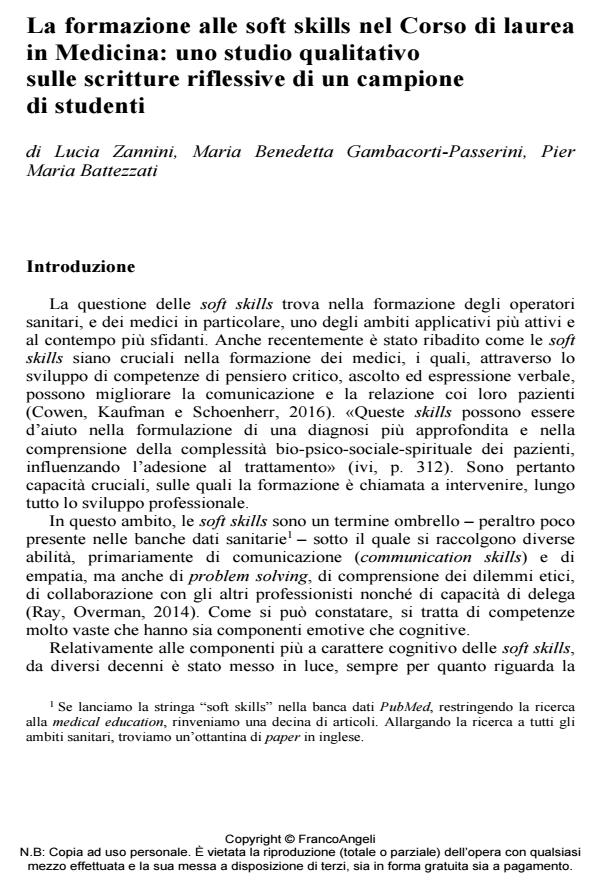Educating to Soft Skills in Undergraduate Medical Education: a Qualitative Study on Reflective Writings of a Students’ Sample
Journal title EDUCATIONAL REFLECTIVE PRACTICES
Author/s Lucia Zannini, Maria Benedetta Gambacorti-Passerini, Pier Maria Battezzati
Publishing Year 2016 Issue 2016/2
Language Italian Pages 17 P. 9-25 File size 242 KB
DOI 10.3280/ERP2016-002002
DOI is like a bar code for intellectual property: to have more infomation
click here
Below, you can see the article first page
If you want to buy this article in PDF format, you can do it, following the instructions to buy download credits

FrancoAngeli is member of Publishers International Linking Association, Inc (PILA), a not-for-profit association which run the CrossRef service enabling links to and from online scholarly content.
Educating to soft skills is crucial in health-care contexts. These competences include communication skills, empathy, problem solving and also attitude to professional collaboration. Among the diverse pedagogical strategies that could be chosen to develop those competences, which include both emotional and cognitive factors, reflective writing seems to have a prominent role. This paper reports a qualitative explorative study, based on the reflective writings of a group of medical students, which were written during a course focused on soft skills, addressed to 2nd year medical students (University of Milan, San Paolo Teaching Hospital). Writings reported students’ first encounter with the patient, in the ward, which was aimed at gathering his/her illness experience. Among the 101 collected writings, 70 were casually selected and later analyzed by three blinded researchers. In each writing, researchers evaluated the level of reflection (Moon scale) and looked for the presence of specific characteristics (selected from the reflect grid): the perception of patients’ emotions and the students’ own feelings, the reference to patient’s social context, the experienced difficulties in the relationship with the patient and lessons learned about the future medical professional role. Data analysis showed a quite high level of reflection, slightly greater in females than males. As to patients’ gender and age, no associations emerged with students’ reflections. Students’ writings seem to be mostly focused on their own feelings, while reflection on patients’ emotions appears slightly inferior. This underlines the emotional impact of the experience on students and, therefore, the need for a specific pedagogical work focused on listening to their emotions and aimed at elaborating meaning. Patients’ social context is the aspect on which students reflect more in depth, while they are less focused on the encountered difficulties and considerations about the medical profession. Authors conclude that students’ response to this training can be considered good; they point out strengths and weaknesses of the educational project, which could be useful for those who are planning educational activities similar to those reported in this study.
Lucia Zannini, Maria Benedetta Gambacorti-Passerini, Pier Maria Battezzati, La formazione alle soft skills nel Corso di laurea in Medicina: uno studio qualitativo sulle scritture riflessive di un campione di studenti in "EDUCATIONAL REFLECTIVE PRACTICES" 2/2016, pp 9-25, DOI: 10.3280/ERP2016-002002